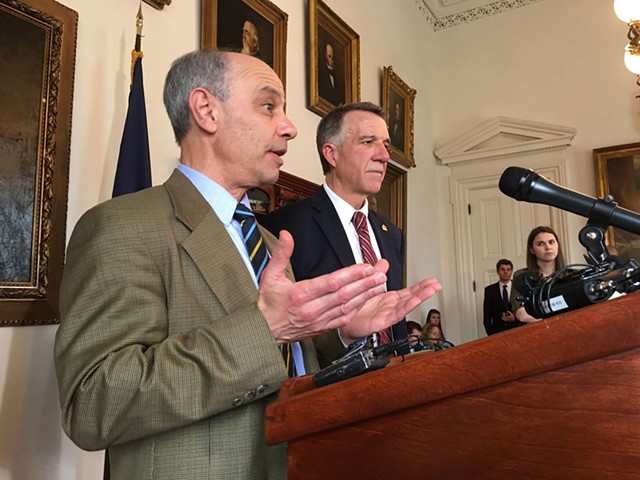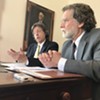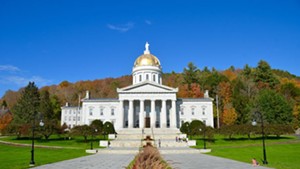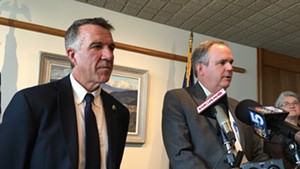
- File: John Walters
- Finance Commissioner Adam Greshin and Gov. Phil Scott
Gov. Phil Scott's administration on Thursday proposed requiring Vermont school districts to revote on budgets they already approved in response to a projected shortfall in the state's education fund.
Finance Commissioner Adam Greshin outlined the proposal during a virtual meeting with the House Ways and Means Committee. He said school budgets approved prior to the coronavirus pandemic will need to be drastically scaled back due to a looming deficit in the education fund.
"The tax consequences of the approved budgets are radically different from what they were when voters went to town meeting," Greshin said. "And I don't think I'm going too far out on a limb to suggest that the budget votes would have been different — or the budgets themselves would have been different — if voters knew then what we know now."
The proposal is likely to spark a heated debate between Scott and the legislature, which has defeated
other gubernatorial attempts to tinker with local school budgets. Scott's proposal to take money from K-12 schools to increase spending on early childhood programs and higher education, for example, landed with a thud.
Of course, the financial challenges of a post-pandemic world are a far different beast. Fiscal analysts project a nearly $170 million gap in next year's education fund — one that Greshin said could force the state to raise property taxes up to 14 percent, based on budgets that local voters passed in March.
The finance commissioner said he could establish education payments without voter input to address the shortfall. “Or, I would suggest the more democratic approach — and one more aligned with Vermont’s system of local control over education spending — is we could ask districts to revote their budgets later in the summer, as the state is gonna do with the general fund," he said.
In the meantime, districts could adopt a "skinny" budget that would base spending on the previous year's budget. That would help districts better understand their fiscal health and give the state more time to assess the allowable uses of the Coronavirus Relief Fund, Greshin said. Voters could then head to the polls "with their eyes wide open."
“I’m confident that Vermonters will understand the challenges we face, and I think they’ll appreciate the initiative to let them participate in the solution," Greshin said.
For lawmakers, however, the proposal seemed to potentially raise more problems than it would solve. They peppered administration officials with logistical questions and challenged the suggestion that revoting budgets would actually lead to a more democratic process.
"Are we really going to hear the voice of voters in this time that we're working in now, with social distancing and trying to hold meetings remotely and getting questions answered?" asked Rep. Kitty Toll (D-Danville), chair of the House Appropriations Committee. "How would all this information get out to voters, and how would we ensure that their voices are actually heard if we can't hold a town meeting in a school gymnasium with 300 or 400 people?"
Some worried that the proposal would launch schools into further instability, pointing to the 19 districts that have yet to vote on budgets this year.
"The amount of chaos in those districts is palpable," said Rep. Kate Webb (D-Shelburne), who chairs the House Education Committee.
Others were skeptical that school districts would even be able to find ways to cut spending. Noting that personnel costs represent about 80 percent of all education expenses, some wondered why teachers' unions that have already inked contracts would agree to reopen negotiations only to accept lower pay.
Education Secretary Dan French responded that they may do so for the good of their district, particularly if faced with political pressure from local voters.
"If the choice becomes closing a school to navigate a budget, versus salary increases ... giving the voters that information to make those difficult choices, that's the nature of our system," he said.
And while French acknowledged that the administration's plan does pose many challenges, he said Vermont's education system desperately needs to evolve in light of the financial realities of the next few years to remain viable.
“I don't understand how we can maintain the trajectory we are [on]," he said, "where some teachers and employees of school districts will be receiving raises at precisely the time where we’re going to have some of the highest unemployment rates since the Great Depression; where education spending decisions were based on assumptions that were made six months ago."
There are typically only two main ways to address budget gaps — cut spending or increase taxes. But some lawmakers believe there's a third option.
Rep. Janet Ancel (D-Calais), who chairs Ways and Means, said her group has already backed a plan to keep next year's property taxes at the same rate they would have been had the pandemic not hit. She conceded that the committee has not yet figured out how to fill the remaining gap. "But it isn’t going to be increased property taxes," she said.
One potential savior may come in the form of Vermont's $1.2 billion federal coronavirus relief funds, a pot of money that lawmakers and administration
officials have already sparred over in recent weeks.
Current federal guidance prohibits using these funds to offset revenue gaps. But many states have asked Congress to provide them more flexibility, and legislators remain hopeful that they may be able to find creative ways to distribute the money.
Still, administration officials on Thursday stressed that no one knows when — or whether — the feds will allow states to spend that money more liberally, which is why Greshin said relying on it to cover the education fund losses is the “definition of aspirational budgeting."
“I’m not suggesting that anything I’ve said is easy or ideal," he said. "These are extraordinary times, and they call for extraordinary measures."
But the unprecedented challenges that lie ahead are exactly why the state cannot afford to cripple its education system, Ancel said. Proposing to take money from schools as they are asked to navigate this new and uncertain world "is just unacceptable," she said.



















Comments
Comments are closed.
From 2014-2020, Seven Days allowed readers to comment on all stories posted on our website. While we've appreciated the suggestions and insights, right now Seven Days is prioritizing our core mission — producing high-quality, responsible local journalism — over moderating online debates between readers.
To criticize, correct or praise our reporting, please send us a letter to the editor or send us a tip. We’ll check it out and report the results.
Online comments may return when we have better tech tools for managing them. Thanks for reading.